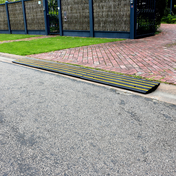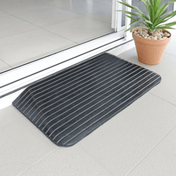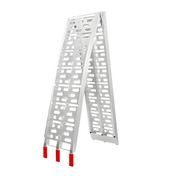When it comes to loading gear, machinery, or vehicles safely, the right ramp can save you time, effort, and even your back. One of the most common questions we hear at Ramp Champ is:
“Should I choose aluminium or steel?”
The answer depends on what you’re loading, how often, and where you work. In this guide, we’ll break down the strength, safety, cost, maintenance, and portability of each option so you can pick with confidence.
Quick Comparison: Aluminium and Steel Loading Ramps
Choosing between aluminium and steel ramps comes down to a few key factors—things like weight, strength, rust resistance, durability, ongoing maintenance, cost, and how you plan to use the ramp.
Here’s a quick side-by-side comparison:

Load Capacity and Strength
When you’re moving heavy machinery, tools, or equipment, strength isn’t something you can compromise on. Let’s break down how aluminium and steel ramps measure up when it comes to handling weight and standing up to regular use.

Aluminium Ramps
Don’t let the lighter weight fool you—aluminium ramps are built tough. They can handle everything from motorbikes and ride-on mowers to small excavators, depending on the design.
- Good strength-to-weight ratio
- Can flex slightly under load
- Suitable for moderate to heavy-duty use
Steel Ramps
Steel ramps are the heavy hitters. If you’re loading large machinery or industrial gear, they’ll give you that extra peace of mind with their rigid, robust construction.
- Heavier but extremely strong
- Ideal for heavy machinery or frequent industrial use
- Less flex and more rigid under pressure
💡Important: Always check the Safe Working Load (SWL) of the ramp before buying or loading. Capacity can vary depending on ramp length, axle spread, and the type of equipment being used.
Safety and Ease of Use
Loading gear isn’t just about strength. You want to feel confident that the ramp will stay put, offer a solid grip, and be easy enough to set up without needing an extra set of hands every time.
Aluminium Ramps
Aluminium ramps strike a great balance between safety and convenience. Most come with non-slip tread or cut-out grip surfaces, giving you decent traction even if conditions aren’t perfect.
- Grippy surface for tyre traction
- Lightweight and easy to handle solo
- Some models include raised side rails for added control
Steel Ramps
Steel ramps feel rock-solid underfoot. They’re heavier, but that extra weight helps keep them planted during loading. Many also feature open-grid or checker plate designs to improve traction.
- Stable under heavy loads
- Strong grip on rough or wet ground
- Bulkier and harder to move alone
Cost Considerations
When choosing between aluminium and steel ramps, price is often a deciding factor—but it's not just about what you pay upfront. It’s also about what you get for your money over time.
Aluminium Ramps
Aluminium ramps generally cost more to manufacture, which can make them pricier upfront. But they’re built to last and require very little maintenance, so the value holds strong over time.
- Higher initial cost
- Minimal maintenance expenses
- Long-term investment for regular use
Steel Ramps
Steel ramps are typically more affordable to buy, making them a budget-friendly option—especially for occasional use. But keep in mind that they may need extra care or treatment in the future.
- Lower upfront price
- May require rust-proofing or repainting
- Good value for heavy-duty or short-term use
Maintenance and Lifespan
A good ramp should work hard without needing constant attention. But depending on the material, some ramps require more upkeep than others, especially if they’re used outdoors or exposed to rough conditions.
Aluminium Ramps
Aluminium is naturally rust-resistant, so it holds up well in all sorts of weather. With minimal care, it’ll keep performing for years.
- Naturally corrosion-resistant
- Simple to clean and store
- Long-lasting with little maintenance
Steel Ramps
Steel is tough, but it needs a bit more looking after. If left untreated, it can rust over time—especially in wet or coastal areas.
- Prone to rust without galvanising or coating
- May need repainting or rust protection
- Built to last, but needs regular checks
Portability and Handling
If you're loading gear on the go or working solo, how easy it is to move and position your ramp matters just as much as how strong it is. Here’s how each material stacks up.

Aluminium Ramps
Aluminium ramps are built for mobility. Their lighter weight makes them ideal for tradespeople who are constantly loading and unloading gear across different sites.
- Easy to lift, carry, and reposition
- Great for solo operators or mobile jobs
- Fits neatly in most UTE trays or trailers
Steel Ramps
Steel ramps pack serious strength, but they come with extra bulk. They’re best used in situations where they stay put or there’s help available to move them.
- Heavier and more effort to handle
- Suited to fixed setups or team handling
- Often too bulky for easy transport
Which Ramps Should You Choose?
Choosing between aluminium and steel comes down to the kind of work you’re doing and how you use your gear. Both materials have their strengths—but one might suit your setup better than the other.

Final Thoughts: How to Choose Between Aluminium and Steel Loading Ramps
By now, you’ve got a solid understanding of how aluminium and steel ramps compare. But if you’re still unsure, ask yourself:
-
What am I loading, and how much does it weigh?
Heavy machinery = steel. Moderate loads = aluminium.
-
Do I need to move the ramp often?
If yes, aluminium’s lighter weight makes life easier.
-
Am I working solo or with a crew?
Solo = aluminium. With help = steel can work too.
-
Will it be exposed to the weather?
Aluminium handles the elements better without rusting.
-
What’s my budget?
Steel ramps are more affordable upfront, but aluminium offers great long-term value with less upkeep.
Get the Right Ramp for the Job - Without Guesswork
At Ramp Champ, we match you to the right ramp based on your load, your worksite, and your budget. Explore our full range of loading ramps or chat with our team for expert advice.







2 comments
Hi Royce,
We do have portable aluminum wheelchair ramps. Please email us at hello@rampchamp.com.au or call us at 1300 913 047 so we can provide you options and work on a quote for you.
Do you have wheelchair Ramps in Aluminum to Government Regulations AS1428.1